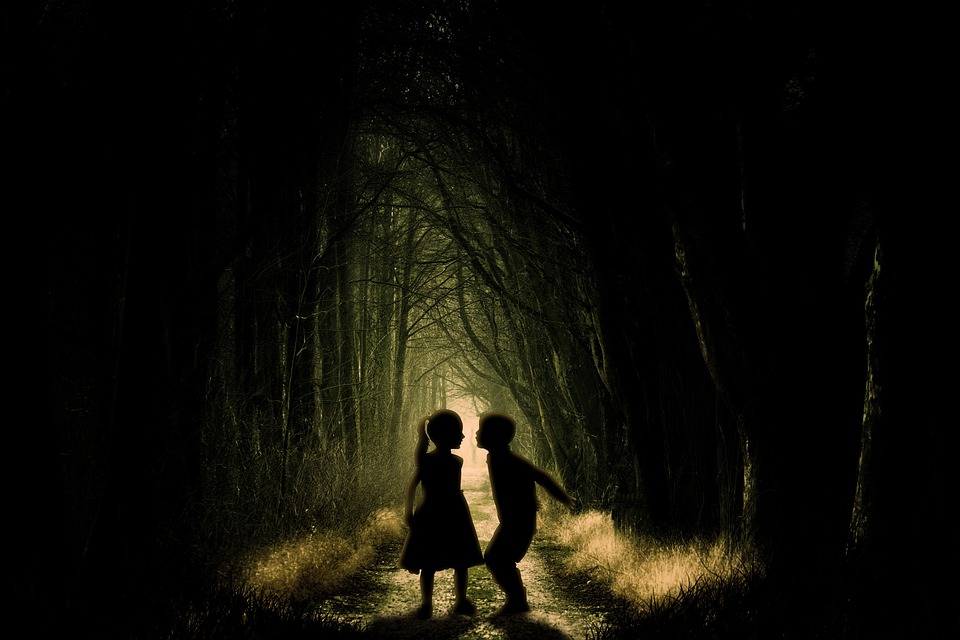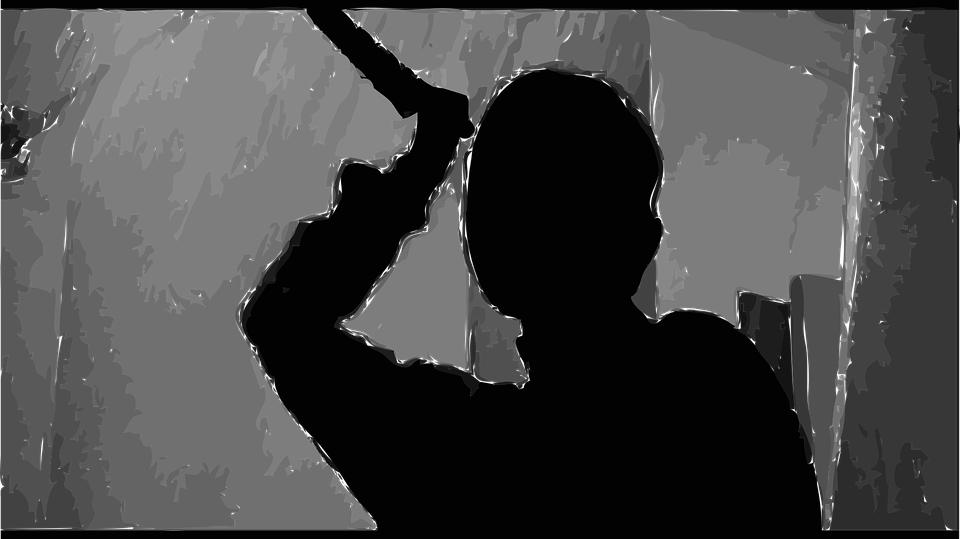Why Are Kids So Scary?
movies·@lazarus-wist·
0.000 HBDWhy Are Kids So Scary?
 <center></center> Whether they be zombies, vampires, poltergeists, or demons, the popular monsters in the horror genre all have one thing in common. They are nothing like us. An other, beyond all reason or feeling, which we fear as instinctively as death itself. In most cases, they could be said to represent a literal manifestation of death, the exact opposite of ourselves as living, breathing creatures. So why is it, that among the Draculas and the Kruegers of our popular imagination, children are so often cast as the source of this instinctive fear? The Ring, The Grudge, The Omen, The Orphanage, Them, Insidious - the list just goes on and on. True, a lot of the child antagonists in these films channel one of the more traditional culprits, and are not presented as horrors in and of themselves. Yet the reason why they make such ideal vessels for our fear is not immediately obvious. <center></center>  <center></center> The go-to answer is that children are considered innocent, and that innocence makes them all the more shocking as an expression of evil. The idea that a child could harbour murderous intentions is so alien to us as a society, so unnatural, that to see it acted out on screen or in the pages of a book is profoundly discomforting. Intense media reaction to real life examples of this phenomenon, such as the murder of James Bulger in the UK, reflect the kind of collective disbelief which these fictional stories are attempting to evoke. As a surface level analysis this makes a lot of sense. It is perhaps what we are responding to consciously when we watch children behaving rather-more-than-badly in horror movies. The thought that, just maybe, they aren’t nearly as innocent as they appear. Fear, however, is not only or even primarily a conscious experience. It is an intuitive reaction, the fight or flight response we revert to when confronted with something that at a base level makes us concerned for our lives. Part of the appeal of the horror genre is that [it enables us to confront death](https://www.psychologytoday.com/gb/blog/in-excess/201510/why-do-we-watching-scary-films), the root of all fear, in a safe environment. Much in the same way that tangential phobias, of spiders or dogs for instance, can be treated by repeat exposure to their triggers. In a very real sense, horror films provide a kind of cultural therapy for that ultimate anxiety, posing as the zombie, the thing from outer space, the sentient doll. A literal manifestation of that other state of being, or non-being, which in our day to day lives we can scarcely bring ourselves to think about. <center></center>  <center></center> So again - why children? Could anything be further from our popular conception of death? Perhaps that’s the point; rather than a contrast in innocence, it is a contrast in mortality which we are responding to when, for instance, the ghost girl starts disjointedly clambering out of the TV during the The Ring. She is a vision of decrepitude, of the sickness and rot we typically associate with old age, embodied instead in the form which above all others symbolises life itself. Our society holds up children as the very essence of life, their youthfulness as something to be coveted and protected. Their potential futures represent a world which will continue to exist long after we ourselves have passed on. Having children is, currently, the closest any of us can come to achieving immortality. As a result, it makes sense that depictions of this life blood of humanity, cloaked in the trappings of death, should fill us with such instinctive dread. The ghost girl scrambling across the floor towards our hero is not only threatening his life, but the cycle of life itself. This seems all the more evident when we consider that in The Ring, her violence is ‘spread’ like a virus, infecting all those unfortunate enough to watch the offending video tape. It’s not just The Ring, either. Perhaps the earliest entry into this sub-genre of killer kids - The Omen - stars a literal anti-christ, the satanic prophet whose arrival signals the end of days. When there is no future for our children, when they themselves become the harbingers of death, that is when our fragile existence as a species is brought most harshly under the spotlight. <center></center>  <center></center> There is, however, another potential explanation. One which further emphasises this idea of films, and horror films in particular, as being a kind of cultural therapy for our collective fears. It seems too great a coincidence that in the field of psychiatry, childhood is generally considered to be *the* critical period in our cognitive lives. This is where we most often pick up our irrational phobias, develop patterns of thought and behaviour, and start to create a frame of biases and preferences through which we perceive the world. These things follow us into our adult lives and [form the concrete core of our personalities](http://sideeffectspublicmedia.org/post/childhood-trauma-leads-brains-wired-fear). What’s remarkable (and endlessly obstructive for psychiatrists) is that we rarely remember anything significant about this period of development. Most of us have fleeting, disconnected memories of those early years - a birthday party here, a scary dog there - but nothing like the ones formed after we ‘arrive’ into our fully fledged, mature consciousnesses. Looking back at ourselves as we were aged five, it can be hard to reconcile that child with what we are now, twenty or thirty years on. Who that five year old was, and the mindset they occupied, is locked away from us. There is no chance we will ever get it back. They are, in a sense, an ‘other’. More so than innocence, or even their symbolic youth, this ‘otherness’ is what separates the adult world from the childhood one. It is a world experienced through emotional response, lived moment to moment and unbounded by layers of rationality which are yet to be developed. As a result, it is impossible to know a child in the same way that two adults can know one another. Humans fear the unknown, the other, the darkness at the bottom of the stairwell which could contain any number of death-delivering ghouls. Is it possible that we fear this dark space in our own subconscious the same way - the unknown, preadolescent mind which conjured up all other phobias in the first place? <center></center>  <center></center> What kids in horror movies present us with, then, is an unflinching view into that irrational, emotional world which we have long since departed. It’s this contrast in fear itself, rather than innocence or youth, which is perhaps most instinctively discomforting - to see the primary victims of fear become its agents instead. Where most horror movie monsters exist as literal manifestations of death, these children are instead the literal manifestations of our ability to feel fear at all. As with all the other classic creatures, children are separate to us, occupying a psychologically distinct world in contrast to our own. Yet at the same time, they are the place we have all come from, a place we have all known but are incapable of remembering. To look upon the black silhouette of a child, grinning maliciously atop the staircase, is to recall for a moment what it was to feel completely and inconsolably afraid. The dark side of that otherwise carefree state of mind which none of us have any desire to go back to. What is as alien to us now, as rational adults, as the thought of not thinking at all. <center></center><center>@lazarus-wist</center><center></center><center><sub>[Image 1](http://knowyourmeme.com/memes/evil-toddler) - [Image 2](https://pixabay.com/en/people-adult-dark-woman-man-3187920/) [Image 3](https://pixabay.com/en/psycho-shower-scene-movie-murder-29041/) - [Image 4](https://pixabay.com/en/apocalypse-war-disaster-destruction-2459465/) [Image 5](https://pixabay.com/en/stairs-light-dark-gloomy-night-2799299/)</sub></center>
👍 ubg, chutneyethanoic, manyellee, smatrsteem, bennettitalia, apprceiator, bithmb.hot, postpromotter, isleofwrite, deirdyweirdy, sensation, tygertyger, markangeltrueman, fourfourfun, steemsearch, randomwanderings, warmcracklesound, fourfourzappl, curie, awesomianist, jacalf, tantawi, steemanator, locikll, aboutyourbiz, howtostartablog, zacherybinx, makrotheblack, gambit.coin, mseuno, phogyan, mhel, karyah1001, life.goals, tradeownsystems, dxdei, gabox, bleyker, birgitt, smartlip, jesusj1, bridgetdaniels, wandersells, maidisangkot, caesar2341, esaia.mystic, skaybliss, thedrewshow, monoindustrias, speaklife, sneikder, goddywise4-eu, chemistry0, bimijay, meansunlare, emmemm, victoryudofia, eddieboo, strings, widiaendah, babaj, kamilala125, snowgoat, binarycounter, hoobeehey, edinsoo, kul0tzzz, rheyss08, saystraight, julianalpanta, chimtivers96, jerscoguth, wrpx, dzued, nightdragon, shawnycx, arellanoyan, estherekanem, nickiechua, akaikeru, ichigos, garnan1111, vact, dashfit, sethroot, dyancuex, pacokam8, cryptophunk, devi1714, lrsm13, nitego, kofspades, muliadi, runningman, safril21, maxruebensal, smafey, helyorsini, enzor, rmz, silasvogt, masud222, sayed53, pipo092281, parag, kimaben, eleonardo, zerin.tahmid, studytext, saharia, chullbull, enjoyy, hasan086, ilovekrys, evernew, rasamuel, cerventus, lukecreed, laritheghost, amf6, zorto, patriamreminisci, jayboss, aaronteng, debbietiyan, will12, saifannur-mzy, yuniraziati, ajpacheco1610, lovetouch, metalhero, basir92, amirdesaingrafis, fai.zul, marielitux, atjehsteemit, forgottendreams, the-doubled, stuckinacup, beni96, phaazer1, bil.prag, azharmaulana, toyosiartdiy, chillingotter, donjyde, oldtown, pwner, crispycoinboys, mohamedsabry, bdshakib, muammarnst, selfedmade, busytime, count-antonio, hulya.rtk.krsn, steemaniax, ikeror, agrestic, jngg87, mrjokar, bravofer, jenisbet, farabi, opluke, anime.lovers, dinaislamdina, kaplat, lulita24, the-tourist, blackelephant, winkandwoo, jhayehidio, gpwebers, devitech, ghost2, mittalamit284, vellotinna, hendrikdegrote, jgpro, carolynseymour, ghostgtr, ckcryptoinvest, misterakpan, tanyaschutte, olayemzeecool, clweeks, derekvonzarovich, gotgame, mayowadavid, peaceandwar, digitalpnut, zulfan88, grafflinz, odesanya, zlatkamrs, mkmk, cryptospreads, ssierra, cheesom, operahoser, jpmkikoy, caitycat, breezieblack, noechie1827, vegan.niinja, new.diak, ehtishamjadoon, sampath94, steempeninsula, hanakaruhokagata, vlogger56, anyes2013, har5h, glorimar, maryjohnson, mylittlestar, devangbuch, arc.angel, chrisjayl, wisata, haikalisifa, askyflyhigh, hiddenblade, ari16, dazzy, ahmad097, mbahtutorial, kaestel, mohazjadoon, rizkiadi, dynet, realredimi2, insaallah99, paulove, tasjun, leeyen23, etaletai, redencion123, qberryfarms, awesome-p, jakecrypto, niouton, alejandro99, marzuki-r, theminnowhelper, elpriist, bathijp, jumpup, mojacko, dotman-art, techupdate, jpgalih, babalsilau, mzh.hamim, dexvid, mvoalevine, ziaaa, lexcreativz, anwenbaumeister, raymondspeaks, roguewriter, j3dy, moksamol, getrichordie, thatsweeneyguy, lotfiuser, mrstaf, rishadhaque, gps7530, whiteliquor, g0nr0gue, shippou95, paddygsound, kike313, joendegz, hrovat66, heibert210, anikekirsten, hermansanchezg, stahlberg, iamfo, pboss123, yucee, didic, haggislove, christinegegare, christianunger, ivan-g, polycarpedet, yarinergonzalez, josegalanton, tanzy, harris2017, bavi, liewps, davidcentenor, beshooo, budika, kevinwalton, travelerjoe, alltechevent, jembee, elisea, jickirti, onethousandpics, marcuz, geekmind, kyanzieuno, idafc, derson, madonna2018, steemitarcher, firman2908, liquidpoopcorn, richardgreen, mindbuilder-sc, siraizel, cringytv, mahmudulhassan, vicmic, mariabutto, boyaceh, emmalg87, ninihorlah, kayegrasya, libe, earnstech, vtechifie, edundayo, bitson, cryptoisfun, robchen, hansmast, hrtstrings, nicole24, karibeweb, time.toeat, ipally, radioboots, bradondamyx12345, cryptobl4ck, steemingnaija, boygaruda15, aguirod, haogee, joshglen, charlie777pt, resteemer, foways, fanstaf, beyondthecrypto, nolasco, sweetdreams, neumannsalva, lemi, tomcruse, mustika, jhanmervz, takeru255, poodai, thuraaunghtet, jose27117, kimchi-king, bluntsmasha, engineeringfeed, drmake, hugo.exe, gamezine, steemerturk, creatrixity, mrday, themanwithnoname, davt014, asonintrigue, juandvg, jamunawng, upyinnyarthutha, carloslgonzalez, tranghuyen, nopenotagain, smiing11, ninjarobo, critday, cryptoitaly, morph3us, lphnfotografia, lianbloog, thesteemmustflow, smer, egheprincez, dubbio, vinothkanna, cosmophobia, sagor94, marcozina, aishpandey, fischkopp, kiwijuce3, vmkoko, astrophoto.kevin, call-me-howie, flipandflop, david9122, rockinggameworld, eugenia2914, betoviiil, dzulfikartns17, gatis-photo, arcanu, sciencebox, sayeedrock, deniree-celis, thefauceteer, dekpah, dong-a, naayren, sshowoff, juanl11, saridezraa, zygi, attorneyatlawl, feederr, alpha-today, khunfarang, khunpoom, joe.nobel, ckbahdon, nationall, open-asset, akumar, dolphinscute, echavez82, claysee, soufiani, kruznik, niko3d, saimon312, heirastu, egomez, tafgongthe1st, seventhsun, withbristy, sadnesscarl, digital-jesus, avijeetthakur, k-syusteem, chrstnv, krathos, sthephany, mirzantorres, angelzam, patapa, derg, lagrangemit, riemman-stielmit, sergiotorres, tropicalgrey, jireneye, maikolp, carlosvls, amelisfer, andypalacios, scienceboard, jasb, juanchop, karinablanco, vzlauniversity, karlab, masterkey1, michaelto, changevictory, matrixbinary, fclosamigos, plumesteemit, brandsteemit, parchazar, trickgame, jjsegovia, truelovemom, tecnosc, purplepaper, wonderfulfood, marlecarmona, mrandreas, lenin-mccarthy, hectgranate, one-person, esteliopadilla, t1050108, patetemj, anonymous13, ahsanabdullah, pipks, iamwhatiamnot, e-troubled, jade56, green77, i-have-tested, mannylumanao, ihal0001, superwoman916, vzacosta, damzxyno, nikola.kalabic, mrgranville, adamllokman, jayna, wildmanhowling, the-naked-geek, wackou, jdc, kingingodwin, wdoutjah, modernmclaire, wealth4good, thomaskatan, teafp, m03kr1, cmbugua, gio6, landria, foxesal, michelios, thinknzombie, sublimenonsense, massivevibration, happychild, ilhuna, benleemusic, charlotteroze, rosenderevies, cobloc, crescendoofpeace, jorx, eroticabian, sanderdieryck, lola-carola, jaeydallah, zorang, orcheva, eduardonarvaez, lifediaries2nd, reungkhoem, alextone, aware007, torico, aehiguese, nonsqtr, jazzyjeff, abeatc, vigna, rfburton, lk666, kkbaardsen, reseller, honeysara, cooknbake, marysent, timbicktwo, odebgaming, mdsaifultop, delph-in-holland, xanderslee, anarchojeweler, culgin, mrxplicit, fidelpoet, raquelita, fullabeans, gwapoaller, bcfriday, barutundefteri, flawlessal, sigmund, apteacher, jacobzeema, bluedragon1974, toby-l, vietthuy, tysir, horribleorbit, carpet.duck, chinwengozi, ronasoliva, walletexpert, shepherd-stories, jbrrd, ascheriit, varignon, ddschteinn, liverussian, roelandp, barton26,